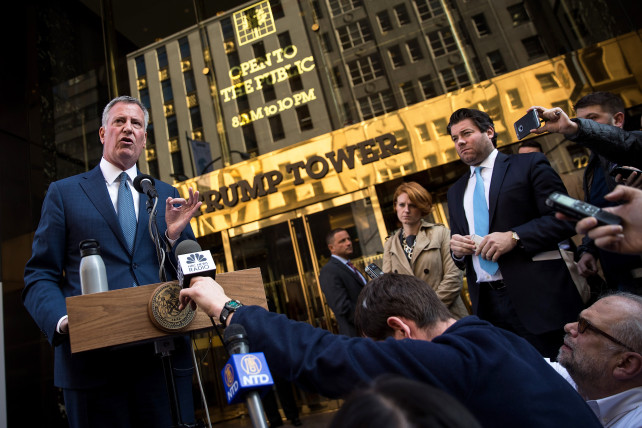by: Justin Pascone
State and local elected officials have been quick to react to the election of Donald Trump and his continuing transition into the White House. Governor Cuomo, an early supporter of Hillary Clinton, vowed to work with Trump while assuring New Yorkers their state would remain a “refuge.” Cuomo expanded in a post declaring: “The State of New York has a proud legacy as the progressive capital of the nation, and that is more important today than ever before. As New Yorkers, we have fundamentally different philosophies than what Donald Trump laid out in his campaign.”
In the past weeks, Cuomo has found common ground with Trump, especially on infrastructure. Cuomo recapped a call between the two: “We were talking about the need for infrastructure, the need to get it done differently so that it’s actually on-time, on-budget. Mr. Trump is very much a private-sector builder. I’ve built in the private sector also. So he has a natural orientation towards the needs of this type of urban area… So it was a good conversation, and I look forward to working together.”
Mayor Bill de Blasio, another Clinton supporter, committed to working with the new administration to “rebuild our infrastructure, create more jobs, protect our residents, and preserve the liberties that New Yorkers enjoy.” In his recent #AlwaysNewYork proclamation, de Blasio vowed to mount a legal challenge if the federal government tries to create a registry of the nation’s Muslims. The mayor also promised to protect immigrant families threatened with deportation, pledged that an aggressive stop-and-frisk policy would never return to New York, and vowed to defend New Yorkers from any cuts to federal funding for Planned Parenthood, stating, “We will ensure women receive the health care they need.”
Alicia Glen, Deputy Mayor for Housing and Economic Development, commented on Trump’s call for infrastructure, saying, “It’s no secret that I and many people have been yelling for many years now that we need a federal focus on infrastructure. To the extent that [Trump is] serious about that, to me is fantastic news.” But, she said, City Hall will be watching carefully as the Trump Administration moves from campaign mode to governing. “It is the priority that none of his rhetoric on the campaign is turned into policies,” she said. “That’s not going to happen. End of discussion.”
City Council Speaker Melissa Mark-Viverito affirmed New York would remain a sanctuary city. During a press conference, Mark-Viverito explained: “We need to say that. We need to take ownership of that term, and say that we are not afraid of what we have done to continue to demonstrate and affirm that the vast majority of immigrants contribute positively to our city and to our economy.” Several council members, including Brooklyn’s Carlos Menchaca and Queens’ Daniel Dromm, echoed similar sentiments.
Brooklyn Borough President Eric Adams views the election results as a call to action for younger New Yorkers. “High school students and junior high school students are protesting. Our country was asleep until Trump was elected,” he said. “People are so busy looking at what Trump is going to do us, and not looking at what we are going to become again. We are going to become alive. We are going to start focusing on real issues again.” Trump, Adams said, “doesn’t have what it takes to take away the best things we have in this country.”
Pulse Points
- On 11.16.16, the New York Building Congress (NYBC) named Carlo Scissura its next President and CEO. He will succeed Richard Anderson, who has served as President of the NYBC for the past 23 years. Scissura, who has served as President and CEO of the Brooklyn Chamber of Commerce since 2012, will take over on 01.01.17. At that time, Anderson will assume the title of President Emeritus and continue to serve the NYBC as a consultant.
- On 11.16.16, the City Planning Commission voted to increase the fee charged for air-rights transfers in the special district that includes Broadway’s theaters to either 20% of the actual sales price or 20% of $347 per square foot – whichever is greater. The issue has been sent to the City Council for a vote. Developers currently make a payment of $17.60 per square foot to the Theater Subdistrict Fund when they purchase air rights from playhouses between West 40th and West 57th Streets from 6th to 8th Avenues.
- On 11.17.16, Mayor de Blasio released his administration’s November modification to the city’s budget, announcing an $83.5 billion spending plan for Fiscal Year 2017 – $1.3 billion larger than the spending plan the City Council approved in June 2016. The largest single new source of increased spending comes from the city’s Department of Homeless Services, with $52 million more for shelter costs. Among other new expenses is $29 million in additional mayoral spending, including $5 million for the Board of Elections, $8.5 million for the city’s Law Department, and $7.7 million for the Department of Design and Construction.
- On 11.22.16, the NYC Landmarks Preservation Commission named 11 historic buildings in Midtown East as New York City Landmarks. All 11 buildings, calendared since this past summer, received a unanimous verdict for landmark status, including the Pershing Square Building, the Graybar Building, the Shelton Hotel Building, and the Yale Club of New York City. The move come as the city advances its plan to rezone Midtown East in 2017 to attract more modern office buildings to the neighborhood.
- Alicia Glen, Deputy Mayor for Housing and Economic Development, acknowledged that the administration is considering taking a 20% cut from air rights sales in Midtown East. Under the rezoning proposal, the district’s 3.5 million square feet of landmarked air rights can be transferred throughout Midtown East – with a portion of the sales going to specific infrastructure improvements. The city is also considering a floor price for the air rights, but the details on that option have not yet been released.








